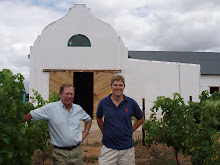The SA industry is planning a new ethical standard -
what's the point?
The South African wine industry is besieged by standards. There's
the IPW (Integrated Production of Wine) which was introduced in 1998 and is
South Africa's voluntary environmental sustainability scheme. Then there's SAWIS (S A Wine Industry Information & Systems)
whose certification seal shows the wine has been certified by the Wine and
Spirit Board and is a mark of authenticity. Linked to it is the WO (Wine of Origin)
scheme which marks providence. And of course there's the ubiquitous BBBEE,
designed to help level the playing field. That's all before you've entered the
international game, in which case you'll need an HACCP (hazard
analysis and critical control points), or a beefed up version for the UK called
a BRC (British Retail Consortium), or an ISO (International Organization
for Standardization). So what is this new standard? And is it really
necessary?
WIETA is an South African ethical trade in agriculture
initiative. It was established a decade ago and describes itself as 'a
multi-stakeholder, non-profit voluntary organisation which actively promotes
ethical trade in the wine industry value chain'. There is support from a
body of international retailers, unions and established industry organisations to
help WIETA establish an ethical seal that will testify to reasonable working
conditions, based on rigorous and closely monitored qualification criteria.
Sounds good. Clearly, fair and equitable
treatment of workers is the right thing: morally, economically, socially,
ethically, politically, legally. You would be hard pushed to argue otherwise.
The impetus behind this new standard, which will entitle
producers who make the grade to use the seal on their wine, seems to have been
twofold. Firstly, to counteract the negative publicity surrounding cases of labour
malpractices in the wine industry; WIETA CEO Linda Lipparoni (quoted on wine.co.za) hopes that the standard
will 'protect them from any potential
negative publicity resulting from those who flout the law'. And
secondly, to bring all the many ethical
standards under one major umbrella ethical certificate.
The WIETA standard 'precludes the use of child labour,
asserts that employment should be freely chosen and that all employees should
have the right to a healthy and safe working environment. Amongst the
conditions it sets are that workers should have the right to freedom of association,
a living wage and to be protected from unfair discrimination. Worker housing
and tenure security rights should also be respected.' And what monster could disagree with that? But,
hold your righteous horses a second, aren't there already serious measures in
place to ensure all this already happens? Even if
you wanted to, you can't just go about firing people on a whim - the
CCMA would have your guts for garters! Fortunately South Africa has a very highly
developed legal system, first world labour
laws and conforms to fierce ILO (International Labour Organization) standards -
so wouldn't the right course of action, in a case of any of the above, be
vigorous legal action rather than a wrap on the knuckles from WIETA?
Perhaps it is insufficient government control and support of
these stringent laws that allows the odd malfeasant to slip the noose? No doubt
there are black sheep out there. But will another acronym, rather than a
vigilant legal system and a watchful media, bring them back into the fold? Perhaps wine producers could simply wear WIETA
funded stickers that say 'Law Abiding Citizen!'.
What do you think?
Want to know more?
http://www.ipw.co.za/
http://www.sawis.co.za/
http://en.wikipedia.org/wiki/Hazard_analysis_and_critical_control_points
http://www.iso.org/iso/home.html
http://wieta.org.za.www34.cpt3.host-h.net/
http://www.wine.co.za/News/News.aspx?NEWSID=20300&Source=News













